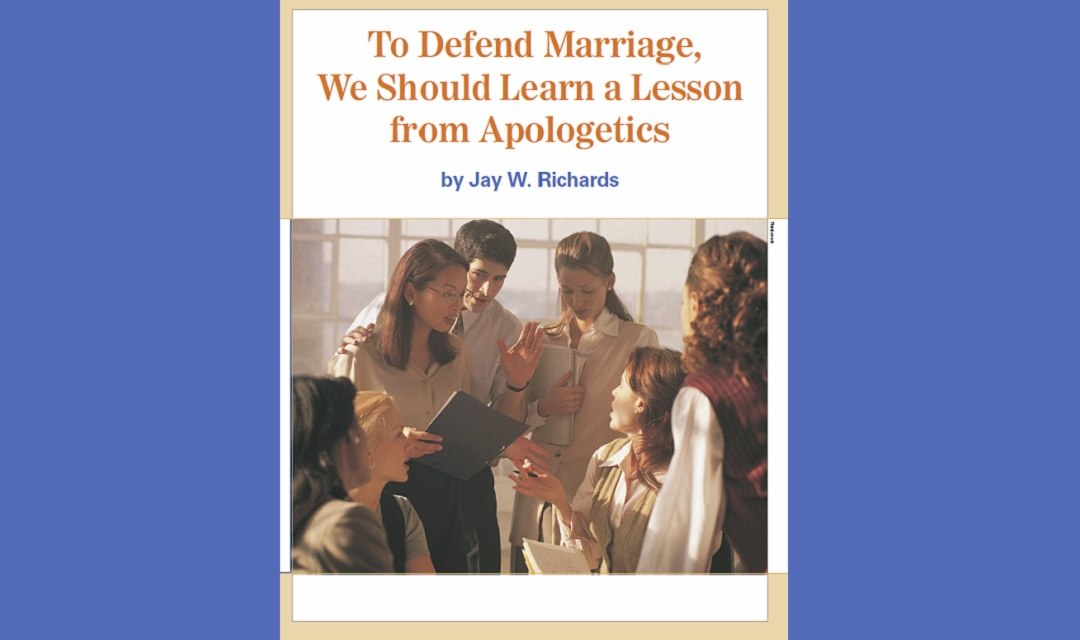This article first appeared in Christian Research Journal, volume 35, number 04 (2012). The full text of this article in PDF format can be obtained by clicking here. For further information or to subscribe to the CHRISTIAN RESEARCH JOURNAL go to: http://www.equip.org/christian-research-journal/
No good Christian apologist speaking at a state university would step to the podium and offer the following as a proof for God’s existence:
Premise: In the beginning, God created the heavens and the earth.
Conclusion: Therefore, God exists.
The argument, given a couple of plausible assumptions, is valid. And since the first premise is true, it’s also sound. But it’s still a bad apologetic. Good apologists appeal to publicly available evidence—that is, evidence already known or believed by the target audience; and from that evidence, they use reason to try to make a persuasive case for, in this example, God’s existence.
MAKING PUBLIC MORAL ARGUMENTS FOR MARRIAGE
This point seems obvious when the subject is the existence of God. Unfortunately, too many Christians forget the lesson when dealing with so-called “social” issues in the public square. Instead, they will often cite a biblical text. In debating marriage law, a popular pastor in the Seattle area likes to tell skeptics, “God made Adam and Eve, not Adam and Steve.” No one is persuaded.
Never before in Western history has the institution of marriage been more in danger. Most of the media and elite culture claim that same-sex marriage is a matter of “marriage equality.” If you oppose it, then you’re a bigot. Now, what kind of argument is this? Notice that although it doesn’t appeal to a religious belief or biblical text, it is an explicitly moral argument. It implies that justice, individual rights, and a commitment to equality should lead one to support same-sex marriage. I don’t think it’s a good argument, but it is an argument that appeals to moral principles that most Americans—Christians or not—believe.
If we want to preserve marriage as a public institution, we must make persuasive counterarguments that appeal to widely held moral convictions. The good news is that everyone has some moral knowledge, what Paul called the “law written on the heart.” Though sin blurs our knowledge of this “natural law,” good moral arguments can help bring it into focus.
THE GOOD OF MARRIAGE
The easiest public argument to make in defense of traditional marriage is to focus on the benefits of marriage. The collapse of marriage and the epidemic of divorce since the 1960s have given social scientists decades of data to study, and the results are in: marriage is good for us, and divorce is not.
Based on solid empirical evidence, we know that men and women in their first marriages tend to be healthier and happier than their counterparts in every other type of relationship—single, widowed, or divorced. They’re also less depressed and anxious,1 and less likely to abuse drugs and alcohol. Married adults are more sexually fulfilled. They’re better parents, better workers, and are less likely to be perpetrators or victims of domestic violence.2
Social scientists have concluded that married men are less likely to commit crime and more likely to hold down jobs. Single people can, of course, live fulfilling lives. The apostle Paul commends the single life as a wonderful gift for those who are called to it (1 Cor. 7:7–8). Those called to marriage, however, tend to be much better off if they are married rather than divorced. Marriage scholars Linda Waite and Maggie Gallagher sum up the results of thousands of scientific studies: “A good marriage is both men’s and women’s best bet for living a long and healthy life.”3
The same thing is true for children. On almost every metric imaginable, a child is much better off reared by his married mother and father. This one fact is more important to a child’s well-being than his race, his parents’ education, or his neighborhood.4
These are statistical measures. Some heroic single parents and their kids overcome the odds, and any institution can be distorted and even destroyed by human sin. Still, all things being equal, marriage is good for us, and divorce is not.5 These are moral arguments of a sort, since they assume that it’s better for human beings to prosper than to languish in poverty, dysfunction, and despair. They have value, but they don’t quite address the moral intuitions that cause many to support same-sex marriage.
WHAT IS MARRIAGE?
If marriage is such a good thing, after all, why can’t men marry men and women marry women? The question assumes that marriage is about people doing what they want to do. Given the nature of marriage, though, it doesn’t make sense to refer to a relationship between people of the same sex, no matter how intimate, as marriage.
The argument here is not based on evidence from social science, but on conceptual analysis. We need to determine the common core of marriage amidst all the cultural variety. In an important article in the Harvard Journal of Law and Public Policy, Sherif Girgis, Robert George, and Ryan Anderson boiled down the basic ingredients of conjugal marriage: “Marriage involves: first, a comprehensive union of spouses [husbands and wives]; second, a special link to children; and third, norms of permanence, monogamy, and exclusivity.”6 Notice the word “norm”—ideal. The norm is the same even if some marriages fail to fully achieve it. A proper end of the marital act is children, even if a child doesn’t result from every conjugal act, just as a proper end of playing football—to take a trivial example—is to score touchdowns, even if in some football games, nobody scores a touchdown.
The word “marriage” refers to a unique relationship. In marriage, a husband and wife unite comprehensively, with their whole beings. We are spiritual and physical beings. Any union that is comprehensive—all-encompassing—must include a union of bodies. The connection of bodies that is a true marital union will fulfill a true purpose that could not be fulfilled otherwise.
Each of us has one biological function that we cannot, by ourselves, complete: sexual reproduction.7 That purpose can only be fulfilled by a specific kind of union with another human being of the opposite sex. To reproduce naturally, a male and female must unite their bodies in the sexual act. In this one way, we are naturally incomplete as individuals and organisms.
Marriage protects, reflects, and reinforces this powerful, complementary, reproductive part of our natures. No relationship between two men or two women can qualify as marriage because ultimately same-sex pairing cannot “achieve organic bodily union since there is no bodily good or function toward which their bodies can coordinate, reproduction being the only candidate.”8
An infertile man and woman can still marry, since it is “mating that gives marriage its orientation toward children. An infertile couple can mate even if it cannot procreate. Two men or two women literally cannot mate.…A child fulfills the marital relationship by revealing what it is, a complete union, including a biological union.”9 Same sex unions can’t bring together complementary organs and body systems that are designed to procreate.
Marriage, then, is a comprehensive union of body, mind, emotion, and soul, a proper end of which is children. Ideally, it should also be permanent, exclusive, and monogamous. As the most fundamental human institution, social mores and a public commitment can and should reinforce it.
WHAT HARM IS THERE IN REDEFINING MARRIAGE?
OK, but how would it harm your marriage in Texas or North Carolina for two men to “marry” in California or New York? This is like asking if the value of a real dollar in Texas would be affected by flooding the market with counterfeits in New York.10 Yes, it would be, because counterfeits degrade the value of all real dollars. Enshrining a false definition of marriage in our laws will inevitably harm all marriages and society. Same-sex marriage does not expand the meaning of marriage, but replaces its historical meaning with a counterfeit.
If people of the same sex can legally “marry” each other, we will lose any rational basis for barring polygamy, group marriage, and incest, and for encouraging marriage to be exclusive and permanent. The reason for restricting marriage to one man and one woman is that it takes exactly one man and one woman to make a complete pair. That logic of completion evaporates if people of the same sex can marry. The arguments used to defend same-sex marriage work just as well for defending any voluntary relationship imaginable.
“Monogamous marriage,” say Glenn Stanton and Bill Maier, “is democracy for the domestic and sexual lives for men and women.”11 Polygamous cultures (which are almost always polygynous—one husband with more than one wife) are much more competitive and unstable. Where monogamy is the norm, a man—no matter how powerful, rich, or attractive—can have, at most, one wife. With polygamy, he’s free to “collect” as many wives as he can, leaving the less powerful men without prospects. History tells us what happens to cultures with large numbers of men lacking marital prospects. Typically the men turn to prostitution and are more likely to prey on the society that has not made a place for them. Polygamy also lowers the status of women, especially of the wives who must compete for the same man’s attention. So rather than balancing the sexual competitiveness of men and women, polygamy makes the problem much worse.
Redefining marriage would foment culture wars everywhere, ending with a draconian loss of religious freedom. If same-sex marriage is defined as a basic human right, a matter of justice and equality—as its advocates claim—then no one could publicly defend real marriage for long. Government would have to treat traditional views as irrational bigotry. Everyone who holds the view of marriage heretofore held in every culture would be opposed by this culture. Ministries would be forced to revise their principles or close up shop. Catholic Charities already has had to abandon its adoption services in California, Massachusetts, and the District of Columbia to avoid being forced to place children with same-sex couples.12
If the state redefines marriage, we should expect to see marriage collapse as a public institution. Several European countries in which same-sex marriage is legal show what may come. Laws have permitted same-sex marriage in the Netherlands since 2001, and rather than a marriage paradise, with straight and gay couples typically living in long-term, monogamous bliss, fewer and fewer Dutch bother to get married at all. Children are no longer connected to marriage. People just live together, and many have a hard time figuring out why marriage is even relevant.13
Same Sex Marriage’s Self-Destructive Moral Argument
But wait. If you support limited government and individual rights, shouldn’t you oppose laws that define or favor traditional marriage? Or shouldn’t the state get out of the marriage business altogether, and just treat us as individuals?14
No. Marriage is a public institution with public consequences. If it weren’t, no one would be clamoring for same-sex marriage to be legally sanctioned. The reason we’re having this debate is because, by definition, it’s about public recognition and approval, not private vows. Andrew Sullivan, a supporter of same-sex marriage, makes that clear. “Including homosexuals within marriage” he observes, “would be a means of conferring the highest form of social approval imaginable.”15
Defenders of same-sex marriage appeal to liberty, individual rights, and limited government. These are moral principles shared by the American founders and the Judeo-Christian tradition. As a result, it is precisely here that defenders of traditional marriage must make their case. For, despite superficial appearances, redefining marriage would strike at the foundation of liberty, individual rights, and limited government. This is a public argument based on American founding principles. How so? A limited government doesn’t try to redefine reality as the Orwellian governments of the twentieth century did (including the fictional government of George Orwell’s 1984). A limited government recognizes and defends certain culturally central realities outside its jurisdiction. Our government doesn’t bestow rights on us as individuals. We get our rights from God. A just and limited state simply recognizes and protects what already exists.
Marriage is another such reality. It transcends every political system. Since so many different cultures and religions have recognized and protected marriage, we should conclude that it’s based on human nature and is not merely a social convention that we’re free to change once progressives capture the Supreme Court or the Congress.
In fact, marriage is far more universal and so has more claim to be based on human nature than do our ideals of individual rights and equality.16 Marriage, a unique union of a man and woman, is one of our most basic human relationships. Appealing to nature and nature’s God to defend individual liberty, rights, and equality, which most cultures have not recognized, while ignoring the universal testimony of nature and culture on marriage, is like sawing off the branch you’re sitting on. Put another way, you can’t make war on natural law and then appeal to it for help.
We shouldn’t fall for the superficial appeals of individual rights in this debate. No one has a right to marry someone of the same sex. Given what marriage is, two people of the same sex cannot marry each other. Rights come from our nature, and our nature comes from God. If you deny that, then you deny the basis of all our other rights. The “moral” case for same-sex marriage, then, is ultimately self-destroying. As Christians, we need to be making that case in public, before it’s too late.
Jay W. Richards, Ph.D., is a senior fellow and director of the Center on Wealth, Poverty, and Morality at the Discovery institute, and co-author, with James Robison, of Indivisible: Restoring Faith, Family, and Freedom before It’s Too Late.
NOTES
- Glenn Stanton and Bill Maier, Marriage on Trial (Downers Grove, IL: InterVarsity Press, 2004), 96, 98.
- Ibid., 100–102.
- Linda Waite and Maggie Gallagher, The Case for Marriage: Why Married People Are Healthier, Happier, and Better Off Financially (New York: Doubleday, 2000). Quoted in Glenn Stanton and Bill Maier, Marriage on Trial, 95.
- Stanton and Maier, Marriage on Trial, 103.
- For more details, see chapters eight and nine of James Robison and Jay W. Richards, Indivisible: Restoring Faith, Family, and Freedom before It’s Too Late (Nashville: FaithWords, 2012).
- Sherif Girgis, Robert P. George, and Ryan Anderson, “What Is Marriage?” Harvard Journal of Law and Public Policy 34 (2010): 252.
- In women, this includes both the sexual organs and the lactation systems in breasts. The lactation system itself is complete, but it requires another human being, a baby, to fulfill its proper end. This strengthens the argument above.
- Girgis, George, and Anderson, “What Is Marriage?” 255.
- “The Case for Marriage,” an editorial in National Review, September 20, 2010.
- Stanton and Maier, Marriage on Trial, 43.
- Ibid., 66.
- See discussion of this and other examples in Girgis, George, and Ryan, “What Is Marriage?” 263–65.
- Patrick F. Fagan and Grace Smith, “The Transatlantic Divide on Marriage: Dutch Data and the U. S. Debate on Same-Sex Unions,” Heritage Foundation WebMemo #477 (September 29, 2004), at: http://www.heritage.org/research/reports/2004/09/thetransatlantic-divide-on-marriagenbsp-dutch-data-and-the-us-debate-on-same-sex-unions).
- For an argument along these lines, see David Boaz, “Privatize Marriage: A Simple Solution to the Gay-Marriage Debate,” Slate, April 25, 1997, http://slate.com/id/2440.
- John Cloud, “Will Same Sex Marriage Be Legal?” Time, February 21, 2000, at: http://www.time.com/time/magazine/article/0,9171,996172,00.html.
- As Elizabeth Fox-Genovese wrote, “In the premodern world of clans and tribes, one’s people carried even greater significance, for family grounded and defined what today is known as the individual’s ‘identity.’ The self was understood as the articulation or expression of the group, which was viewed as prior to it, not as an ‘autonomous’ being that could assume and discard commitments at will.” (In Marriage: The Dream That Refuses to Die [Wilmington, DE: Intercollegiate Studies Institute, 2008], 18.)









